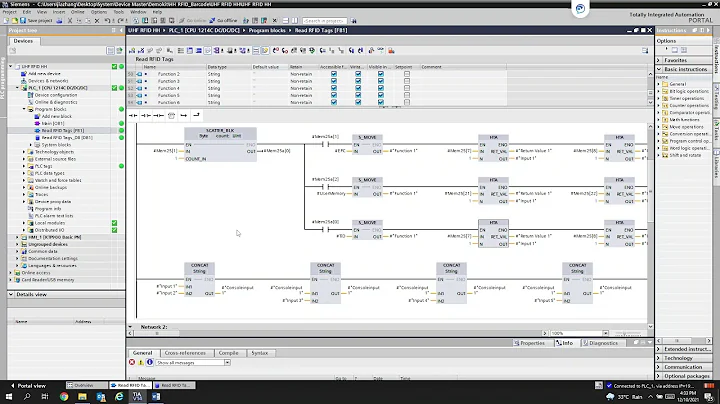Converting a hex string to a byte array
Solution 1
This ought to work:
int char2int(char input)
{
if(input >= '0' && input <= '9')
return input - '0';
if(input >= 'A' && input <= 'F')
return input - 'A' + 10;
if(input >= 'a' && input <= 'f')
return input - 'a' + 10;
throw std::invalid_argument("Invalid input string");
}
// This function assumes src to be a zero terminated sanitized string with
// an even number of [0-9a-f] characters, and target to be sufficiently large
void hex2bin(const char* src, char* target)
{
while(*src && src[1])
{
*(target++) = char2int(*src)*16 + char2int(src[1]);
src += 2;
}
}
Depending on your specific platform there's probably also a standard implementation though.
Solution 2
This implementation uses the built-in strtol function to handle the actual conversion from text to bytes, but will work for any even-length hex string.
std::vector<char> HexToBytes(const std::string& hex) {
std::vector<char> bytes;
for (unsigned int i = 0; i < hex.length(); i += 2) {
std::string byteString = hex.substr(i, 2);
char byte = (char) strtol(byteString.c_str(), NULL, 16);
bytes.push_back(byte);
}
return bytes;
}
Solution 3
So for fun, I was curious if I could do this kind of conversion at compile-time. It doesn't have a lot of error checking and was done in VS2015, which doesn't support C++14 constexpr functions yet (thus how HexCharToInt looks). It takes a c-string array, converts pairs of characters into a single byte and expands those bytes into a uniform initialization list used to initialize the T type provided as a template parameter. T could be replaced with something like std::array to automatically return an array.
#include <cstdint>
#include <initializer_list>
#include <stdexcept>
#include <utility>
/* Quick and dirty conversion from a single character to its hex equivelent */
constexpr std::uint8_t HexCharToInt(char Input)
{
return
((Input >= 'a') && (Input <= 'f'))
? (Input - 87)
: ((Input >= 'A') && (Input <= 'F'))
? (Input - 55)
: ((Input >= '0') && (Input <= '9'))
? (Input - 48)
: throw std::exception{};
}
/* Position the characters into the appropriate nibble */
constexpr std::uint8_t HexChar(char High, char Low)
{
return (HexCharToInt(High) << 4) | (HexCharToInt(Low));
}
/* Adapter that performs sets of 2 characters into a single byte and combine the results into a uniform initialization list used to initialize T */
template <typename T, std::size_t Length, std::size_t ... Index>
constexpr T HexString(const char (&Input)[Length], const std::index_sequence<Index...>&)
{
return T{HexChar(Input[(Index * 2)], Input[((Index * 2) + 1)])...};
}
/* Entry function */
template <typename T, std::size_t Length>
constexpr T HexString(const char (&Input)[Length])
{
return HexString<T>(Input, std::make_index_sequence<(Length / 2)>{});
}
constexpr auto Y = KS::Utility::HexString<std::array<std::uint8_t, 3>>("ABCDEF");
Solution 4
You can use boost:
#include <boost/algorithm/hex.hpp>
char bytes[60] = {0};
std::string hash = boost::algorithm::unhex(std::string("313233343536373839"));
std::copy(hash.begin(), hash.end(), bytes);
Solution 5
You said "variable length." Just how variable do you mean?
For hex strings that fit into an unsigned long I have always liked the C function strtoul. To make it convert hex pass 16 as the radix value.
Code might look like:
#include <cstdlib>
std::string str = "01a1";
unsigned long val = strtoul(str.c_str(), 0, 16);
Related videos on Youtube
oracal
Updated on March 15, 2022Comments
-
oracal about 2 years
What is the best way to convert a variable length hex string e.g.
"01A1"to a byte array containing that data.i.e converting this:
std::string = "01A1";into this
char* hexArray; int hexLength;or this
std::vector<char> hexArray;so that when I write this to a file and
hexdump -Cit I get the binary data containing01A1.-
dhavenith almost 11 years@alexvii That is not an answer to this question.
-
 πάντα ῥεῖ almost 11 yearsYou can set std::streams to hex mode for reading and writing numbers in hex format
πάντα ῥεῖ almost 11 yearsYou can set std::streams to hex mode for reading and writing numbers in hex format -
oracal almost 11 years@makulik I did try using streams and std::hex but couldn't get anything to work. Could you maybe show me an example? Thanks.
-
 fkl almost 11 yearsI don't think any ascii deduction is required, simply use the c api to convert into char array, unless i have gotten question wrong. I have pointed out the api in my ans below stackoverflow.com/a/17273020/986760.
fkl almost 11 yearsI don't think any ascii deduction is required, simply use the c api to convert into char array, unless i have gotten question wrong. I have pointed out the api in my ans below stackoverflow.com/a/17273020/986760. -
Zan Lynx almost 10 yearsBased on a comment you made to another answer I think you need to add to your question what should happen when the input is an odd number of characters. Should the missing 0 be added to the beginning of the string or the end?
-
TheoretiCAL about 6 years@oracal See my answer for a stringstream approach
-
-
oracal almost 11 yearsWhile that does seem to work (can't try it out atm) is there a more standard way?
-
jogojapan almost 11 yearsIs this a "hint" or an answer? And what do you mean by "try this"? Will it work? And is it different from the existing answers? How?
-
Anand Rathi almost 11 years@jogojapan I am happy write the whole code do you really need it ? Can you see the difference in basic approach?
-
jogojapan almost 11 yearsMy problem is that I don't understand what you are trying to tell us. There is a hint, there is a string (followed by another version of that string with
0xprefixed), and then a very short statement about some iteration. The meaning of all this, esp. in the context of the existing answers, isn't clear to me. This will have an impact on upvotes/downvotes you'll get for this. -
 fkl almost 11 yearsI am not sure, the original string has the same elements, why do we need to covert to ascii to get numerical equivalent?
fkl almost 11 yearsI am not sure, the original string has the same elements, why do we need to covert to ascii to get numerical equivalent? -
Niels Keurentjes almost 11 years@fayyazkl I don't understand what you mean?
-
 fkl almost 11 years@NielsKeurentjes What is wrong with using c_str() for the above? Why do we have to manually convert an ascii 'A' to hex A and put in target char *. What you did is correct. I just can't see why you have to manually do it when there is standard api available to covert string to char array.
fkl almost 11 years@NielsKeurentjes What is wrong with using c_str() for the above? Why do we have to manually convert an ascii 'A' to hex A and put in target char *. What you did is correct. I just can't see why you have to manually do it when there is standard api available to covert string to char array. -
Niels Keurentjes almost 11 years@fayyazkl you misunderstood the question - this is about converting the human-readable 4-character string
"01A1"into 2 in memory bytes (1 and 161). Hence ASCII conversion is obviously required. -
Christophe almost 10 years@Niels Keurentjes wonderfull solution ! But what happens if there is an odd number of hex digits. For example AFF ?
-
Christophe almost 10 yearsvery nice char2int() ! But I fear that the result doesn't meet expectations when with odd number of hex digits. For example, try with 6a062a063. I'd understand 6 a0 62 a0 63, but your code makes 6a 06 2a 06 3 out of it.
-
Niels Keurentjes almost 10 years@Christophe because the
whilechecks for*src && src[1]it would parseAFand then encounter a trailing zero onsrc[1], and stop converting. It's similar toatoibehaviour in that respect - it stops on corrupt input. -
Christophe almost 10 years@NielsKeurentjes I'm not sure that atoi() ignores the last odd digit... Don't you think that it looks a little bit like a bug when AFF is handled as AF instead of 0AFF ?
-
Niels Keurentjes almost 10 years@Christophe I was referring to
atoibehaviour of parsing 'as long as it has meaningful input' - if you feed it the string123abcit returns integer123(cplusplus.com/reference/cstdlib/atoi). As such I wrote this function on the same premise of sanitized input, and 'undefined or messy' behaviour otherwise. Adding input validation is rather trivial of course anyway, but not always a wanted overhead. -
xaizek almost 10 yearsYou're right about odd number of hex digits, @Christophe. Thank you! I updated the code to handle such case well (by the way, it's not true for the accepted answer, still better to handle such strings).
-
Niels Keurentjes almost 9 yearsIt should be noted that I wrote the accepted answer as the most performant full solution to the OP's question :) No questions were asked about exceptional cases, so I assumed (like many stdc functions do) pre-sanitized input.
-
Martin Bonner supports Monica almost 7 yearsFantastic! I wanted a way of initializing an array from a string literal, and this is almost exactly what I need.
-
user482963 about 6 yearswell you can always pre-append '0' to for odd sized hex string
-
Erik Aronesty almost 6 yearsBe sure to BN_free
-
 Andriy Plokhotnyuk over 5 yearsdoes it flag invalid input?
Andriy Plokhotnyuk over 5 yearsdoes it flag invalid input? -
Coder1337 over 5 years@NielsKeurentjes I know I am replying to an answer that was posted years ago, but I just want to say thanks for the solution! This is exactly what I needed, I was using another way I found online but it had a few problems and it didn't work exactly like it should have been. So thanks again! :)
-
BenV136 over 3 yearsLove this solution. As a minor observation, do note that char2input can be made slightly more efficient, especially if used heavily. Note that any valid character will be >= '0' so it is more efficient to test for the second character first, as in: int char2int(char input) { if (input <= '9' && input >= '0') return input - '0'; if (input <= 'F' && input >= 'A') return input - 'A' + 10; if (input <= 'f' && input >= 'a') return input - 'a' + 10; } Or test for a, then A and then 0, in that order.









